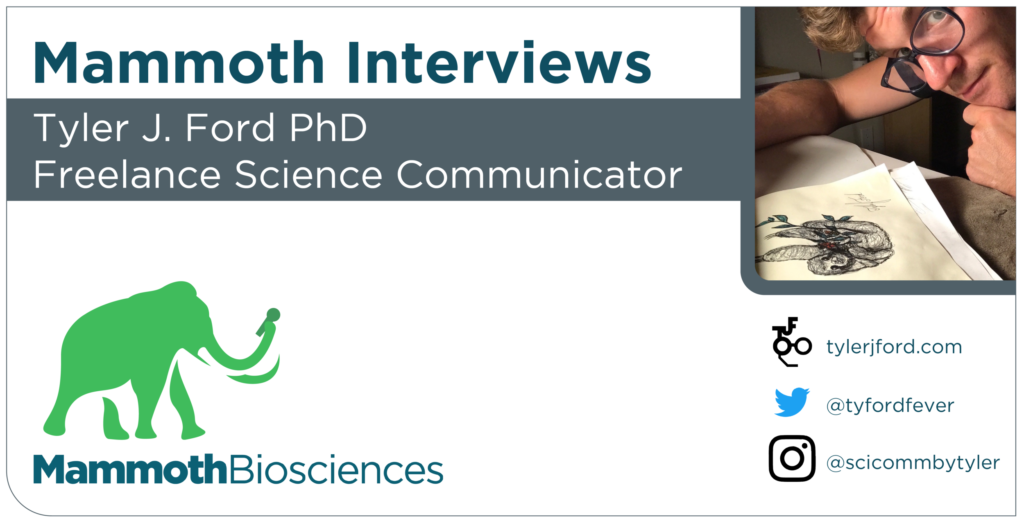Tyler Ford
11/18/2019
We regularly invite scientists to present their research to the Mammoth team. This facilitates collaborations and expands our knowledge of important topics in the worlds of CRISPR, genome editing, diagnostics, and more. Rather than keep what we learn to ourselves, we’ve decided to share it with you through our Mammoth interviews series. This series will feature short Q&As with the many interesting scientists who speak at Mammoth. Get ready for some fascinating science and even more fascinating people!
Our first post features a Q&A with Freelance Science Communicator (and person behind this blog), Tyler J. Ford PhD.

Before diving into freelance science communication, you got your PhD in Biological and Biomedical Sciences from Harvard. What was your research on?
My research career started at Boston University. There, I was an undergraduate Beckman Scholar in Professor Thomas Gilmore’s lab. My project involved studying cancer signaling pathways using inducible genetic systems.
I went on to do my PhD work at Harvard University in Professor Pamela Silver’s lab. In the Silver Lab, I attempted to get bacteria to turn sugar into a gasoline-like compound. The bacteria could do it, but the process probably wouldn’t be very sustainable.
How did you get into science communication?
Science and communication have tugged at my heart strings for many years.
On the science side, biology has always fascinated me. In elementary school, I had tons of books about animals. My favorites were “Why do dogs do that?” and ANYTHING about monkeys.
On the communication side, I’ve enjoyed writing and drawing from a young age. When I was ~3 years old, my mother and I wrote a book about a witch who goes on a pirate ship and eats a lollipop (that was the entire plot). Before college, I dreamt of being a cartoonist (sometimes I still want to be a cartoonist).
These interests collided during my first poster presentation at Boston University. I struggled while explaining my research to a nonscientist and decided to try something new. Instead of exploring the complexities of my work, I asked about his background. I realized that he and I needed to talk about some basic biology before even touching my poster. I excitedly got him up to speed with a series of metaphors involving DNA and libraries. The endorphin hit I got from making his eyes light up with understanding was all I needed. I knew I wanted to do this type of thing for a living.
In graduate school, I took many opportunities to develop my science communication skills. I worked extensively with a science communication student group called Science In the News. I tutored fifth graders. I presented my research whenever I could, and I TA’d for a couple of classes.
Later, I was hired as an Outreach Scientist at a nonprofit called Addgene. Thanks to the wonderful support of the folks at Addgene, I was able to take on many science communication projects. I managed the Addgene blog, created eBooks, hosted a podcast, produced protocol videos, lead workshops, and more. All these prepared me for my current role as a freelance science communicator. In this role, I tackle similar projects for many organizations.
Why do you think science communication is important?
The world is facing an incredible array of complex problems. Things like climate change, food insecurity, and socioeconomic inequality all have solutions. Yet, they require input and buy-in from a diverse array of people. Good science communication will help people understand how these problems affect them. It will also help people choose among possible solutions.
What’s one thing you wish more people understood about science communication?
That you always have to tailor your communication to your audience. There’s this old idea that, if we just make more information available, then people will use it to make better decisions. This is called “The deficit model” and it is false. Good science communicators go to great lengths to help people understand how information is relevant to them and how it fits into their world.
How do you recommend people get started in science communication?
I’m a big advocate of practicing some kind of science communication as soon as you can. This could take many forms:
- You could start your own blog.
- You could volunteer at a museum.
- You could help judge a science fair.
- You could share science with colleagues, friends, and family on social media.
Importantly, you should NOT do any of these things in a vacuum. You should talk to other science communicators to learn what works and what doesn’t. You should also have others review your work whenever possible. You cannot do good science communication in a bubble.
If you’re a graduate student or postdoc, many universities have science communication groups. These groups usually consist of teams of researchers who work together to hone their science communication skills. They might have blogs, host presentations for the public, or even invite researchers to speak about their work at local bars. I’d highly recommend working with one of these groups. They’ll instantly provide you with a network of fellow communicators. These individuals will help you build your skills while you’re in the group and may help you get a job later in life!
You can also get professional science communication training from groups like AAAS, COMPASS, the Alan Alda Center for Communicating Science, Portal to the Public, and Picture as Portal (where I work I work as Science Communications Director). These organizations will teach you best practices in science communication. They will help you do things like eliminate jargon, tell stories, and engage with diverse audiences. Training with one of these organizations can serve as a great catalyst to starting your first science communication project!
